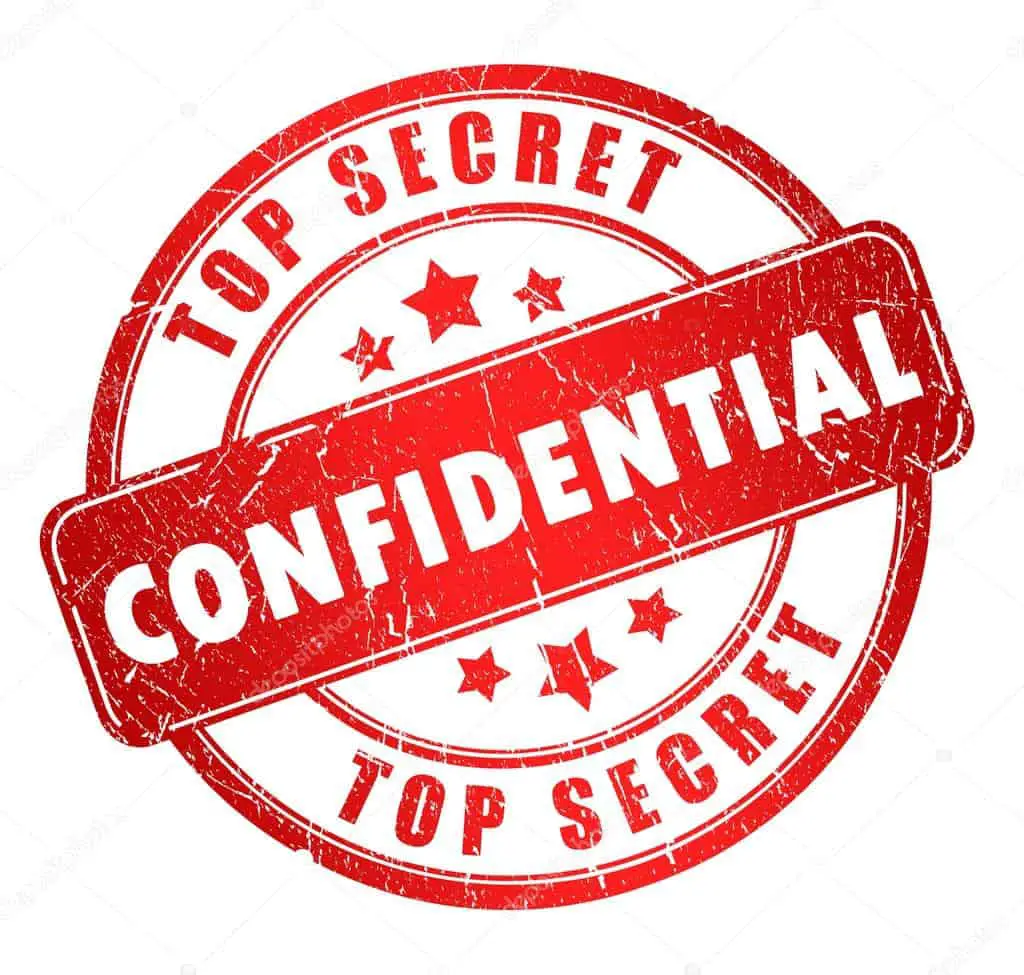The purpose of a confidential letter arises in multiple situations and events. These letters have been essential to the diffusion of information and messages in legal, technical, and office-related issues. In certain circumstances, the expectation of confidentiality holds professional and legal responsibilities. It can be part of law or policy, stemming from particular organizations and institutes.

What is a confidential letter?
A confidential letter is a document containing sensitive or personal information intended to be kept private and not shared with others who do not need to know. The message in a confidential letter is usually filled with classified data and is said to be opened by only the recipient.
It is often used in a business or legal context to convey confidential or proprietary information, such as trade secrets, financial information, or personal information.
Confidential letters are typically marked as such to alert the recipient that the information contained within the document is confidential and should not be shared with others without the sender’s permission. Sender’s cases, confidential letters may be subject to legal restrictions, such as attorney-client privilege, and may only be shared with specific individuals or entities.
It is essential to read confidential letters to keep the information private and secure. This may include using encryption or secure transmission methods, storing the letter safely, and limiting access to the document to only those who need to know.
The recipient is the only person who has the authority and licenses to open the letter and keep the information within it concealed and marked. Confidential letters are of different types. For example, a letter of recommendation is considered a category by the employer, or an instructor submits a reference letter as part of the instructions. Similarly, business transactions and agreements are generally a part of the confidential letter as the information is only available to limited individuals. Failure to comply with it can result in never-ending lawsuits and dilemmas, end the career, and give birth to other legal difficulties.

How to Write a Confidential Letter?
Writing a confidential letter involves taking steps to ensure that the contents of the letter remain private and secure. Here are some steps you can take when writing a confidential letter:
- Mark the letter as “Confidential”: At t” the top of the “letter, write “Confidential” or “P” private and Co “fide” trial” to indicate that t “the contents of the letter are intended only for the recipient’s eyes.
- Adrecipient’ setter appropriately: Address the letter to the specific individual you want to receive it. Avoid using general titles, such as “To Whom It May Conc” rn,” as this could result in the letter being read by unintended recipients.
- Use secure delivery methods: When sending the letter, use a secure delivery method, such as certified mail or a courier service that requires a signature upon delivery. Avoid sending confidential letters through regular mail or email, as these methods are more susceptible to interception.
- Be clear and concise: State the letter’s purpose cleletter’s concisely. Avoid including unnecessary details or information that could compromise the confidentiality of the letter.
- Avoid using sensitive language: Avoid using language that could be interpreted as sensitive or potentially damaging. Instead, use professional and neutral language to convey your message.
- Consider using a nondisclosure agreement: If the letter contains susceptible information, consider including a nondisclosure agreement for the recipient to sign before opening the letter.
Example of the confidential letter :
Dear John,
I hope this letter finds you well. As you may know, our company has recently been invited to submit a tender price bid for a new project that we have been working on. I am writing to you today to discuss the importance of keeping the details of our bid confidential.
Our tender price will be 3.560.000 USD which will be 10% less than last time.
As you are aware, this project represents a significant opportunity for our company, and it is crucial that we put forward a competitive bid in order to win the contract. However, it is equally important that we do not disclose the details of our bid to anyone outside of our organization.
In order to maintain the confidentiality of our bid, I am asking that you refrain from discussing the details of the tender price with anyone who is not directly involved in the bidding process. This includes our competitors, our suppliers, and even our own employees who may not be involved in the project.
I would also like to remind you that any breach of confidentiality could result in serious consequences for our company, including the loss of the contract and potential legal action.
Thank you for your attention to this matter, and I look forward to working with you to ensure the success of our bid.
Sincerely,
[Your Name]
Difference Between Private and Confidential Letters!
Private and confidential letters are both intended for a specific recipient or recipients. Although “private” and “config” confidential ten are used interchangeably, there are subtle differences between the two.
A private letter is a communication intended only for the person it addresses. The content of a private letter is typically personal and is not meant to be shared with others. Confidential letters are often used for informal communication, such as between friends or family members.
On the other hand, a confidential letter is a type of communication that is intended to be kept secret or private. The content of a confidential letter may contain sensitive or confidential information that is not intended to be shared with anyone outside of the intended recipient(s). Confidential letters are often used in business or legal contexts, where privacy and confidentiality are essential.
The key difference between private and confidential letters is the level of sensitivity of the information contained within them. Private letters may collect personal data which is not necessarily sensitive or confidential. Confidential letters, on the other hand, are intended to keep sensitive or confidential information private and secure.
In summary, private letters are intended only for the recipient and may contain personal information, while confidential letters are designed to keep sensitive or confidential information private and secure.
Private and confidential Letter Law
In most legal systems, the right to privacy and confidentiality of personal correspondence is protected by laws and regulations.
For example, in the United States, the Constitution’s FourtConstitution protects individuals from unreasonable searches and seizures, including the government’s access to government correspondence, such as letters. The Privacy Act of 1974 further extends these protections to individuals’ personal information held by federal agencies.
In addition, the Electronic Communications Privacy Act (ECPA) of 1986 provides additional protections for electronic communications, such as emails and text messages. The ECPA prohibits unauthorized access to electronic communications and penalizes law violations.
Other countries have similar laws and regulations that protect the privacy and confidentiality of personal correspondence. For example, in the United Kingdom, the Human Rights Act of 1998 protects individuals’ right tindividuals’ncluding the privacy of their posts.
It’s important to noIt’shat the specifics of these laws and regulations may vary by jurisdiction and context, so it’s always advisablit’s consult with legal professionals for specific guidance.
If you read a confidential business letter without authorization, you could face legal consequences for violating the company’s policies acompany’sially breaking the law. Here are some practical examples of the legal problems you could face:
- Breach of confidentiality agreement: If you have signed a confidentiality agreement with the company, reading a confidential business letter could be considered a breach of that agreement. The company could sue you for damages resulting from the breach, such as lost profits or damage to their reputation.
- Violation of privacy laws: Depending on the jurisdiction, reading someone else’s private correspondence could violate privacy laws. This could result in civil lawsuits, fines, or criminal charges.
- Theft of trade secrets: If the confidential business letter contains trade secrets, such as proprietary information or client lists, reading it without authorization could be considered theft of trade secrets. This severe offense could result in fines, imprisonment, or both.
- Employment law violations: If you are an employee and read a confidential business letter without authorization, you could violate your employer’s policies employer’s. This could result in disciplinary action, including termination of employment.
In summary, reading confidential business letters without authorization can lead to various legal problems, including breaches of confidentiality agreements, privacy violations, theft of trade secrets, and employment law violations. Therefore, it’s always best to consult legal professionals before taking action that could lead to legal consequences.
Confidential Letters in business
Confidentiality is an integral part of the business world as well. This happens when an employee is interested in filing a grievance against a specific business or a company through government agencies that regulate them and act as a bridge. For example, United States consumers can write a confidential complaint letter to the respective agency, highlighting its suspicious fraud schemes and corruption. To maintain further confidentiality, the writer can write privileged on the top, emphasizing and stressing the importance of secrecy. This act can guarantee fairness and objectivity between the customer and employee and augment their relationship as names are hardly exposed, and anonymity is retained.
Confidential letters are mainly composed when the general public wants to keep a particular piece of information out of sight. This situation arises when businesspersons formally shake hands with other business schemes and forums or wish to sign up for new employees. Entrepreneurs might pronounce salary packages and benefits in a confidential letter to potential employees, but they might want to keep it under wraps. When there is a violation of privacy, the entrepreneur or business owners can decide to take legal action against the soon-to-be employee who might have disclosed the information way too soon, considering that info was already marked privileged and confidential.
Internal communication among employees is considered to be a trademark of any organization. Whether the business is small or large, a nonprofit or a government organization, a legal office, courtrooms, or a medical arena, confidentiality seems to be an exclusive approach to guard the business and privacy associated with the employees and patrons. Specific meetings or communication occurs non-verbally or via technology, including video chats; however, written documents are still considered essential and integral to the interaction’s natureinteraction’sial document contains permanent records of obscured ideas and even plans of action that influence a specified company’s whole visicompany’sally, these ideas need to be fully shielded from the public eye. However, sometimes, following and respecting the protocols and recommendations regarding confidentiality and privileged content cannot be overlooked.
Security must be defended; different groups and platforms use numerous languages and expressions to deal with their secret content. Phrases such as top secret, confidential business information, or trade secret are usually ways to classify a private letter. Therefore, a member working in an organization is expected to learn and understand its formal language and terminologies to draft a confidential letter.
Confidential material may also require special assistance and handling. Unlike everyday documents, this letter is transported and placed carefully. The norm is to put the letter in big envelopes highlighting the term confidential. A confidential letter might also carry a unique stamp on the top, stressing it contains specific information. One more thing to note is that not everyone can draft personal and private letters. Only those trustworthy employees with special access to the communications channel can write such letters.
Internal obligations and prerequisites are usually appropriately followed. The person on the receiving end is also expected to know the protocol so that all individuals are in the loop and advocate confidentiality regulations accordingly. Moreover, there should be a clear-cut distinction between sensitive and shared content. There are certain situations when the material is self-explanatorily confidential. For example, when an employee decides to send an annual performance report, the need to maintain its confidentiality is self-evident.





